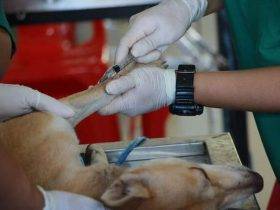Why is my dog ear swollen is a common question pet owners ask themselves once they notice their dog ear is swollen. If you’ve noticed that your beloved canine companion’s ears are swollen, it’s important not to ignore this concerning symptom. Swollen ears in dogs can indicate various underlying issues, some of which require immediate attention. This educational guide aims to provide pet owners with valuable insights into the possible causes of swollen ears in dogs and how to address them effectively.
What are the common causes of swollen ears in dogs?
What could cause a dog’s ear to swell up can be the result of several factors, each with its own set of symptoms and treatment approaches. Understanding the common causes of dog swollen ears is crucial in identifying the underlying issue and providing the necessary care for your furry friend.
Allergic reaction in dogs swollen ears
Allergies are a common culprit behind swollen ears in dogs. Just like humans, dogs can develop allergies to various substances, including certain foods, environmental allergens, or contact irritants. When a dog’s immune system overreacts to these allergens, it can lead to dog ears swollen and red and discomfort in the ears.
Dog ear infections
Dog ear infections are another frequent cause of swollen ears in dogs. What causes dog ear infections ranges from bacteria or yeast. This can thrive in the warm and moist environment of the ear canal, causing inflammation and swelling. They are different dog ear infections types that exist. Other symptoms of an ear infection may include discharge, odor, itching, and frequent head shaking or scratching. There are many ways on how to prevent dog ear infections for your little pet but it all starts by paying attention to your pets health and safety.
Dog ear mites
Dog ear mites, tiny parasites that infest the ear canal, can cause swelling and irritation in dogs. These mites are highly contagious and can spread from pet to pet. If your dog has been in contact with other animals or exhibits symptoms like excessive scratching, shaking of the head, or a dark discharge from the ears, ear mites could be the cause of the swelling.
Hematomas
A hematoma refers to a localized collection of blood outside the blood vessels, often caused by trauma or injury. Dogs with floppy ears, such as Cocker Spaniels or Basset Hounds, are more prone to developing ear hematomas. The constant shaking or scratching of the ears can lead to blood vessels bursting, resulting in a swollen and fluid-filled ear flap.
Foreign Objects or Trauma
Sometimes, foreign objects like grass seeds, splinters, or even insect bites can cause swelling in a dog’s ears. Trauma, such as rough play, fights with other animals, or accidents, can also result in ear swelling. It’s essential to inspect your dog’s ears for any visible signs of injury or foreign objects if swelling occurs suddenly.
When faced with a dog with swollen ears, it’s vital to consult a veterinarian for an accurate diagnosis and appropriate treatment. They will conduct a thorough examination, possibly take samples for testing, and recommend the most effective course of action based on the underlying cause. Remember, early detection and intervention can help alleviate your dog’s discomfort and prevent any potential complications.
How to treat my dog ear swollen
When your dog’s ears are swollen, taking prompt and appropriate action is crucial for their health and well-being. Here are some effective strategies to address the common causes of swollen ears in dogs:
How to treat my dog ear swollen allergic reaction
To address dog ears swollen allergy reactions that causes swollen ears in your dog is vital for their well-being. it is essential to identify and eliminate the allergen triggering the response. Consult with your veterinarian to determine the specific allergen through allergy testing or an elimination diet. Once identified, take the following steps
Dietary Changes: Switch your dog to a hypoallergenic or limited ingredient diet, avoiding the identified allergen.
Environmental Management: Minimize exposure to environmental allergens by keeping your dog indoors during peak pollen seasons and using air purifiers to reduce indoor allergens.
Medications: Your veterinarian may prescribe antihistamines or steroids to alleviate allergy symptoms and reduce ear swelling. Follow their guidance regarding dosage and administration.
How to treat my dog ear swollen cause by Infections?
The best dog ear infections treatment requires a comprehensive approach to eliminate the infection and prevent recurrence. Follow these steps:
Veterinary Examination: Visit your veterinarian near you for a thorough examination of your dog’s ears. They may take a sample for laboratory analysis to identify the specific pathogens causing the infection.
Medications: Depending on the type and severity of the infection, your veterinarian may prescribe topical or oral antibiotics or antifungal medications. Administer the prescribed medication as directed, ensuring complete treatment even if the symptoms subside. Please avoid using amoxicillin without the vet prescription.
Ear Cleaning: Regularly clean your dog’s ears with a veterinarian-recommended ear cleaning solution to remove excess debris and maintain proper ear hygiene. Follow your veterinarian’s instructions on cleaning techniques and frequency.
How to get rid of dog ear mites?
To effectively address dog ear mite infestations and relieve ear swelling in your dog, follow these steps:
Veterinary Diagnosis: Your veterinarian will perform a thorough examination and may take a sample from your dog’s ears to confirm the presence of ear mites. If cost is the problem, you can look at low cost vet near you.
Medications: Your veterinarian will prescribe appropriate medications to eliminate the ear mites, which may include topical treatments or oral medications. Follow the recommended treatment regimen, ensuring all affected pets in the household are treated simultaneously.
Environmental Cleaning: Wash your dog’s bedding and thoroughly clean their living areas to minimize reinfestation. Regular vacuuming can help remove mites and eggs from carpets and upholstery.
how to cure my dog ear swollen caused by Hematomas
If your dog has a hematoma causing ear swelling, addressing it effectively may require veterinary intervention. Here’s what you can expect:
Veterinary Examination: Schedule a visit to your veterinarian for a proper diagnosis and evaluation of the hematoma’s severity.
Treatment Options: Depending on the size and location of the hematoma, your veterinarian may recommend various approaches. These can include drainage and fluid removal, surgical correction, or the use of pressure bandages to reduce swelling.
Preventive Measures: To prevent future hematomas, avoid activities that can cause trauma to your dog’s ears. Additionally, regular ear cleaning and inspection can help identify any potential issues early on.
Foreign Objects or Trauma
If a foreign object or trauma is causing ear swelling in your dog, take the following steps:
Inspection: Carefully examine your dog’s ears for any visible signs of foreign objects, such as grass seeds or splinters. If you can safely remove the object without causing further harm, do so gently. However, if the object is deeply embedded or you are uncertain, consult your veterinarian for assistance.
Trauma Management: If your dog has experienced trauma, such as a fight or accident, seek immediate veterinary attention. The veterinarian will assess the extent of the injury and provide appropriate treatment, which may include wound cleaning, medication, or even surgical intervention.
General conclusion
In conclusion, when your dog’s ears are swollen, it’s crucial to identify the cause and address it effectively. Whether it’s an allergic reaction, ear infection, ear mites, hematoma, or trauma, involving your veterinarian in the diagnosis and treatment process is essential. Follow their recommendations, maintain regular ear care, and prioritize your dog’s overall well-being to promote healthy and comfortable ears for your beloved pet.






Leave a Reply